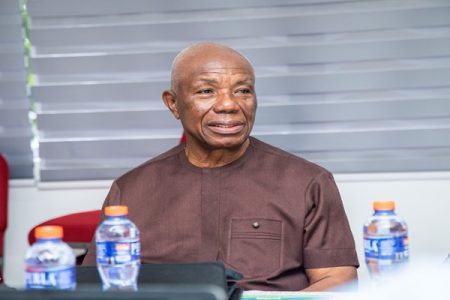Retired Justice of the Supreme Court, Justice Jones Victor Mawulorm Dotse, has called for the abandonment of Ghana’s current hybrid Presidential-Parliamentary system of governance in favor of a more defined presidential system.
He advocates for the country to choose between a Presidential system, where all ministers are appointed from outside Parliament, and a Parliamentary system, where all ministers are selected from within Parliament.
Ineffectiveness of the current hybrid system
Speaking at a Ministry of Parliamentary Affairs stakeholders consultation workshop, Justice Dotse argued that the existing hybrid system, in which the President appoints the majority of his ministers from Parliament, is ineffective.
He noted that many MPs from the majority side vie for ministerial positions, which distracts them from their core duties as lawmakers.
Additionally, he observed that ministers are often absent when needed to answer questions on the floor of Parliament.
Proposed separation of powers
Justice Dotse suggested that appointing ministers from outside of Parliament would allow MPs to focus solely on their legislative and oversight responsibilities, similar to the systems in the United States and the United Kingdom.
In his view, this would lead to more efficient governance.
Call for restricting Supreme Court jurisdiction
In addition to his call for a revised governance system, Justice Dotse proposed restricting the jurisdiction of Supreme Court judges to constitutional matters, should their number be capped. This, he argued, would streamline the court’s functions and enhance its focus on key constitutional issues.
Debate and constitutional review
Justice Dotse’s proposals sparked significant debate during the workshop, further highlighting the importance of a thorough and inclusive constitutional review process.
His comments came during a three-day consultation workshop organized by the Ministry of Parliamentary Affairs.
The workshop focused on validating the Preliminary Report of the Constitutional Review Consultative Committee (CRCC), which is tasked with reviewing the 1992 Constitution of Ghana.
CRCC’s role in the review process
The committee, chaired by Madam Clara Kasser-Tee, is building on the recommendations of the 2010 Constitutional Review Commission (CRC) and its accompanying White Paper, aiming to identify key provisions in the constitution that require amendment.
In her presentation, Madam Kasser-Tee emphasized that the committee’s objective is to ensure the report reflects Ghana’s current democratic realities and aspirations.
Recommendations on constitutional amendments
The CRCC’s preliminary report advocates that non-entrenched provisions continue to be handled by Parliament, while entrenched provisions should be brought directly to the people for deliberation.
The committee recommends allowing citizens to vote on each provision individually, rather than through a single yes-or-no referendum.
- Enterprise Life launches improved education investment solution - 31 March 2025
- Access Bank Ghana launches “Fa Ketewa Bɛgye Kɛseɛ” promo - 31 March 2025
- President Mahama Calls for unity at Eid Al-Fitr celebration - 31 March 2025

